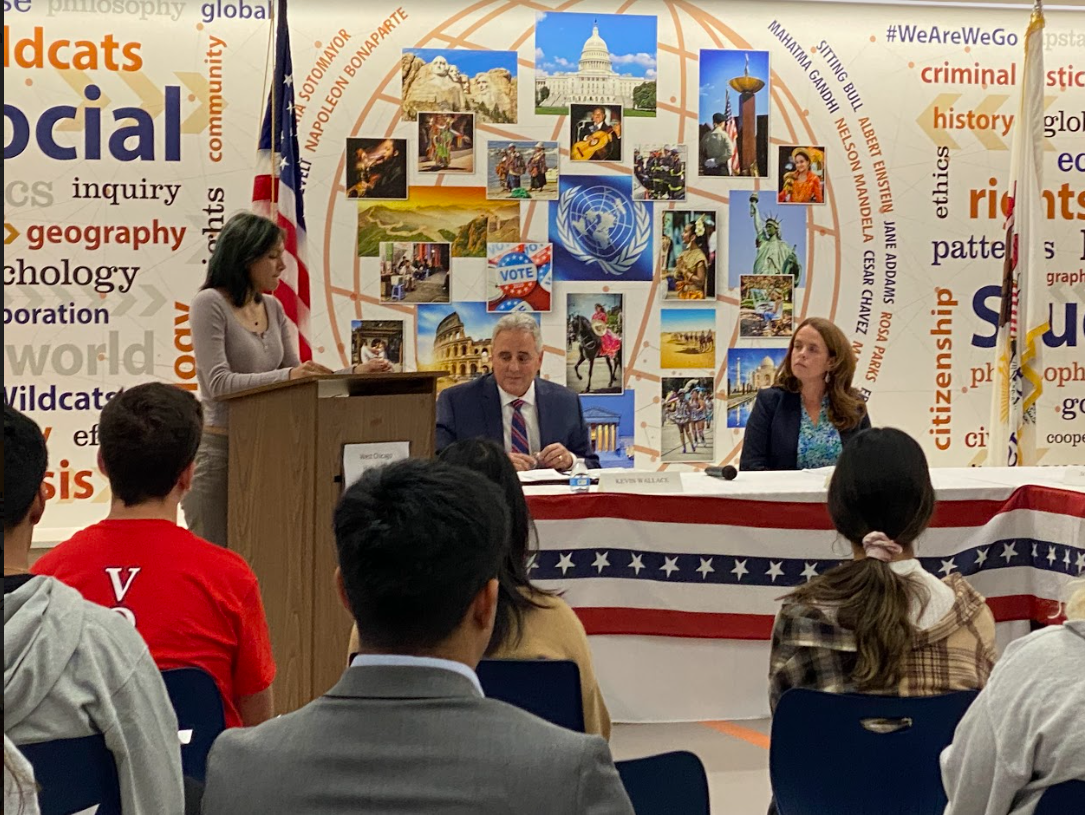Illinois Democracy School Hosts Candidate Forum to Promote Informed & Equitable Voting

This past summer, educators from Illinois joined teachers from around the country in a four-day institute hosted by the Civic Engagement Research Group (CERG) at the University of California-Riverside and the Center for Information and Research on Civic Learning and Engagement (CIRCLE) at the Jonathan M. Tisch College of Civic Life at Tufts University. The purpose of the summer institute was to learn how to facilitate informed and equitable voting in their communities during the 2022 Midterm Elections and beyond.
Topics covered included:
- Key approaches to civic education
- Educational resources and models for teaching about elections and voting in a nonpartisan way
- Research on why schools and educators have a critical role in building informed and equitable voting
- Opportunities to connect to educational goals and content standards
- Dynamics that constrain informed and equitable voting
- School- and community-specific action planning for the 2022 election and beyond
Candace Fikis, an Illinois Civic Hub Instructional Coach and teacher at West Chicago Community High School, an Illinois Democracy School, recently partnered with the Wheaton League of Women Voters for her students to facilitate a candidate forum to educate voters for the upcoming elections. We asked Candace about her experience. Here are her responses.
What did you learn about informed and equitable voting from participating in this summer’s institute?
I learned about specific voting trends of young people nationally but also locally by using the Youth Voting database on CIRCLE’s website. This inspired me to want to do more to help increase youth participation in voting and gave me a resource to share with my students so they could investigate youth voting trends (it was used as a hook for my lesson).
Being a part of this course also allowed me to learn from other educators as they shared their lesson/project ideas with me. It gave me many ideas for developing my lesson and future lessons. This course also allowed me to learn from the facilitators, and I got to connect with Dr. Joe Kahne for the DSN Fall Convening and present with him.
How did you apply what you learned about informed and equitable voting to your classroom this fall?
It guided how I set up the lessons to build the candidate forum. There is a combination of resources to help students understand what local and state governments do (so they can ask appropriate questions). An opportunity to allow students to talk to others in the community to discover the top issues (also to help guide their questions of the candidates) and a chance to investigate the State Senator and House candidates. Here is a direct link to the students’ handouts that guided this:
How did this project deepen students’ knowledge of themselves and their community?
Part of the assignment required students to go out into the community, talk to at least three adults, and ask them about the issues that mattered to them about our community. For many students, it opened their eyes to issues and concerns they had not even considered or understood much about. They used these concerns to develop questions to ask the candidates at the forum.
What comes next? What did students identify as future opportunities to facilitate informed and equitable voting in their communities?
Only about 10% of my students can vote in this general election, but the ones that can feel very informed about their choices. The majority that cannot vote are enthusiastic about teaching their family members about the candidates and giving them direct links to their websites so their families can also become informed voters. I think this lesson and our reflections indicate that those students who cannot vote now plan to vote when they can. I hope our continued partnership with the League of Women Voters will allow us to register future voters and plan other candidate events. The League of Women Voters asked if they could have a copy of the student-generated questions because they thought they were a great representation of issues of concern for the community, and they would like to use them again in other forums.
One student stated to me that it seemed surreal to be able to meet and talk to the candidates after conducting research on them and seeing them in ads. It made it much more personal to learn from them directly. Another student, after learning that the candidates have internships, has connected with the candidate for this opportunity.
This activity also piqued the interest of students to serve as election judges. We had a record number of students apply this year to serve as one, so many they could not find placement for all of them. One parent thanked me for inspiring her daughter to serve as a judge because she wants to get involved in elections, but she is too young to vote yet. She feels like she is doing her part for our democracy.
Those interested in learning more can view the candidate form on the LWV Dupage website
What advice would you give teachers to encourage their students to learn about informed and equitable voting?
Do it! The few days of lessons leading up to the forum were highly received because it wasn’t just about learning content; it was about learning to be an informed citizen. Students saw the real-world application of learning about the different offices, conversing with others about issues, and deciding what issues mattered the most to them and the qualities they were looking for in a candidate. It has given them an intrinsic motivation to continue to study government.
